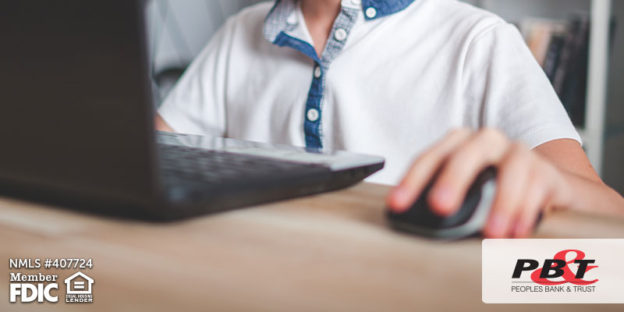Technology is everywhere and used on a daily basis nowadays, so how do we protect our children when online? Now more than ever is the most important time to sit down with your kiddos and really explain the importance of being safe while online. That’s why Peoples Bank & Trust wanted to offer some main points to touch on with your kids when discussing online safety.
Family Rules:
- I won’t tell my address, name, phone number or other special information to anyone online or post it online.
- I will tell mom or dad right away if something does not seem right when I’m on the computer or my phone.
- I’ll never meet anyone I speak to online, unless my parents say it’s okay and come with me.
- I’ll talk to my parents about posting certain things online if I’m unsure, such as pictures.
- I won’t give anyone my passwords, even my best friends.
- I won’t download any games until checking with mom or dad.
- I will not say mean things to anyone online and tell my parents if I do see something like that, or if it happens to me.
- I will have mom or dad help install privacy settings on any online platforms I’m using.
Tips for Mom and Dad:
- Have your child on their phone or computer in open areas, like a living room or kitchen. Don’t allow them to be alone and on technology if they are young.
- If you’re comfortable with it, you can limit what your child does or keep an eye on their actions with certain tools and settings. One tool to use is YouTube Parental Controls. Click here to learn more about this.
- Educate yourself on social media, so you know what your child is getting exposed to.
- Continuously talk to your young children about being safe and make sure they understand and keep the promises above.
- For your older children, give them more space and freedom with their technology. However, continue to have open conversations about what is new in the online world and if they are experiencing any issues such as cyberbullying or came across something that made them uncomfortable.
- If your child has an older sibling and feels more comfortable talking to them, encourage them to have discussions about what they’ve seen online so they can talk about ways to stay safe, as well as what’s right and wrong.
We hope these tips allow you to keep your children safe while online. Technology is an important part of society now, but it’s always vital to keep discussions open and honest about the online world, so there is a good flow of trust and communication within your family.
Peoples Bank & Trust Co.
Member FDIC
Equal Housing Lender





